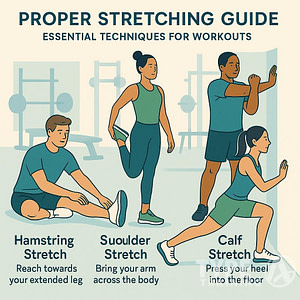Understanding how hydration affects your sleep can significantly improve your nightly rest.
Drinking water consistently throughout the day ensures your body stays hydrated, supporting a stable sleep cycle.
Consuming adequate fluids before bedtime prevents dehydration, which can disrupt sleep patterns.
Popular posts:
The connection between what you drink and how well you sleep is more intricate than it seems.
By including water-rich foods like cucumbers and watermelon in your diet, you enhance hydration levels and contribute to better sleep quality.
Simple changes, like keeping a water bottle nearby, can serve as a reminder to stay hydrated.
Monitoring your hydration habits can help reduce disturbances such as nighttime awakenings caused by dehydration.
This balance is essential for overall well-being, aiding in temperature regulation and minimizing sleep disruptions.
Making these mindful adjustments can lead to a more restful night’s sleep.
The Science of Sleep and Hydration
Hydration plays a vital role in maintaining your body’s temperature and ensuring smooth metabolic functions.
When you are well-hydrated, it supports optimal sleep by aiding in the regulation of the sleep-wake cycle.
Understanding the connection between hydration and your sleep is key to improving rest.
Understanding Hydration and Its Role in Sleep
Hydration is crucial for maintaining bodily functions, including sleep regulation.
It helps in the production of hormones essential for sleep, like vasopressin, which controls the body’s water balance.
Proper hydration aids in temperature regulation, which can influence sleep onset and duration.
Staying hydrated ensures that metabolic processes run smoothly, contributing to better rest.
Your hydration status can affect the secretion of the antidiuretic hormone, which prevents excessive urination during sleep and promotes longer sleep periods.
Ensuring adequate fluid intake throughout the day helps maintain this hormonal balance, allowing for uninterrupted sleep.
The Impact of Dehydration on Sleep Patterns
Dehydration can disrupt your sleep patterns by causing physiological stress.
It may lead to an increased heart rate and body temperature, both of which can make it challenging to fall and stay asleep.
Dehydration affects the body’s ability to cool down at night, which is necessary for deep sleep stages.
A lack of sufficient hydration can also interfere with the production of melatonin, the hormone responsible for regulating the sleep-wake cycle.
The presence of headaches, dry mouth, and nasal passages due to dehydration can lead to discomfort and frequent awakenings during the night, compromising sleep quality.
Water and the Sleep-Wake Cycle
Water consumption influences the sleep-wake cycle, which is part of your body’s circadian rhythm.
Adequate hydration helps maintain the balance and proper functioning of this cycle.
The antidiuretic hormone, or vasopressin, reduces urine production during sleep, minimizing bathroom trips and disturbances.
Consuming sufficient water during the day supports the natural ebb and flow of your circadian rhythm.
It ensures that your body undergoes necessary recovery processes overnight, promoting restful and uninterrupted sleep.
Timing your water intake is crucial—drinking too much before bed can disrupt sleep, while moderate consumption throughout the day optimizes hydration and supports your sleep cycle.
Hydration Through Your Diet
Incorporating water-rich foods into your diet can significantly contribute to hydration levels, supporting better sleep.
Hydrating foods not only provide necessary fluids but also contribute essential nutrients that play a role in maintaining overall health.
Water-rich Foods and Sleep Quality
Certain foods are naturally high in water content and can help maintain hydration.
Watermelon, with its high water percentage, is a refreshing choice. Other excellent options include cucumbers and lettuce, both of which are made up of over 90% water. Strawberries also provide hydration benefits along with their vitamins and antioxidants.
Including these foods in your daily meals can contribute to hydration, supporting body functions that are crucial for sleep quality.
By adding these foods to your dinner or evening snacks, you enhance your body’s ability to stay hydrated through the night.
Benefits of Hydrating Foods for Sleep
Consuming hydrating foods can prevent dehydration that might affect your sleep cycle.
Staying properly hydrated ensures that your body can regulate temperature and maintain physiological processes efficiently, both essential for restful sleep.
Foods like watermelon and cucumbers are low in calories, making them a great snack option without disrupting your dietary goals.
The additional vitamins and minerals they contain, like vitamin C in strawberries, support immune health and overall wellness.
By focusing on foods rich in water content, you’ll supply your body with the fluids it needs, reducing the likelihood of waking up thirsty and ensuring a smoother transition to a restful night of sleep.
Lifestyle Habits Affecting Hydration and Sleep
Ensuring proper hydration is vital for maintaining good sleep hygiene.
Your daily activities, such as exercise and dietary choices, can significantly affect how well you hydrate and sleep.
Additionally, establishing a consistent bedtime routine is crucial for balancing hydration and optimizing sleep quality.
Exercise, Hydration, and Sleep Connection
Regular exercise boosts your physical and mental health, but it also increases fluid loss through sweat.
To counter this, you should drink plenty of fluids before, during, and after workouts.
Staying well-hydrated supports muscle recovery and helps prevent cramps, which can disturb your sleep.
Exercise can improve sleep by reducing anxiety and depression symptoms. However, it’s crucial to hydrate during exercise to avoid dehydration, which can cause sleep disturbances.
Maintain a balanced routine that incorporates proper hydration practices to optimize both your fitness and sleep quality.
Alcohol, Caffeine, and Nighttime Hydration
Alcohol and caffeine can disrupt your hydration balance.
Caffeine, a powerful stimulant, can lead to increased urination, causing dehydration.
Consuming caffeine six hours before bedtime can negatively affect sleep. It’s wise to limit its intake in the evening.
Alcohol may make you feel sleepy initially, but it can affect sleep cycles, leading to restless nights.
Moderation is key, and it’s important to drink water if you consume alcohol to offset its dehydrating effects.
Remaining mindful of your alcohol and caffeine consumption helps maintain hydration and promotes better sleep hygiene.
The Importance of Bedtime Routine for Hydration Balance
A consistent bedtime routine supports good sleep hygiene and helps manage hydration levels.
Drink a small glass of water about an hour before bed to ensure hydration without causing nighttime bathroom trips.
Watching your fluid intake at night helps maintain a balance between proper hydration and minimizing sleep disturbances.
Creating an environment conducive to sleep involves setting a comfortable room temperature, which also aids in maintaining hydration.
Keeping your bedroom cool can reduce nighttime sweating, thereby preserving hydration levels.
Developing healthy bedtime habits contributes to better sleep and hydration balance, fostering a more restful night.
Consequences of Poor Hydration on Sleep
Hydration is integral to maintaining restful and uninterrupted sleep. Inadequate water intake can lead to disruptions that affect various aspects of your nightly rest.
Sleep Disorders and Hydration Issues
Dehydration can significantly impact sleep quality by contributing to several disorders.
One notable issue is the increase in dry mouth, which can cause discomfort and lead to throat irritation. This condition often results in snoring and even complications such as sleep apnea.
Ensuring adequate hydration can help mitigate these issues, potentially reducing their frequency and severity.
In addition, dehydration may also contribute to headaches and muscle cramps, which are known to disrupt sleep.
These physical discomforts can prevent you from reaching deeper stages of sleep, leaving you feeling unrested. Staying hydrated throughout the day can help minimize these symptoms and support a more restful sleep experience.
Effects of Nighttime Dehydration
During the night, dehydration can exacerbate conditions that lead to frequent awakenings.
For instance, it can increase the likelihood of nocturia, the need to urinate frequently during the night. This results from the body trying to balance its fluid levels, disrupting your sleep cycle.
Nighttime dehydration can also contribute to more severe headaches upon waking, further affecting your ability to feel refreshed.
Consuming a balanced amount of water during the day can reduce the risk of these disturbances.
It’s important to balance fluid intake to prevent excessive bathroom trips while ensuring proper hydration.
Optimizing Hydration for Better Sleep
To support sleep, it’s important to manage fluid intake effectively throughout the day and ensure balance during the night.
This can be achieved by focusing on hydration strategies before bed and maintaining an appropriate fluid equilibrium overnight.
Effective Hydration Strategies Before Bed
An optimal approach to hydration begins well before bedtime.
Aim to complete most of your fluid intake earlier in the day to minimize disruptions to your sleep routine.
Drinking water is crucial for maintaining hydration, but it also helps to incorporate magnesium-rich foods or supplements.
You might consider herbal teas such as chamomile in the evening, known for its relaxation properties.
Limit drinks containing caffeine or alcohol as these can disrupt sleep patterns.
A small glass of water before bed can help manage hydration without causing frequent bathroom visits that interrupt sleep.
Maintaining Fluid Balance Throughout the Night
Fluid management doesn’t stop once you’re in bed.
Controlling your environment and diet can assist in maintaining hydration.
Keep your bedroom cool and comfortable to reduce sweating. Using a humidifier can also prevent dryness, especially in colder months.
Monitor your intake of electrolytes, which help the body retain fluid more efficiently.
Foods and drinks containing electrolytes can be beneficial.
If you wake up feeling thirsty, consider electrolyte-rich options over plain water.
However, aim to keep fluid intake at night to a minimum to maintain a restful sleep environment.
Frequently Asked Questions
Drinking water sensibly throughout the day can enhance your sleep quality. Improper hydration timing might lead to disturbances.
What are the implications of drinking water on sleep quality?
Hydration significantly affects sleep quality. Properly managing your water intake can maintain a stable body temperature and improve sleep duration. Inadequate hydration could disrupt sleep cycles, leaving you feeling less rested. Ensuring sufficient fluid intake during the day optimizes your body’s nighttime restorative processes.
How can I hydrate effectively to prevent waking up dehydrated?
To avoid dehydration during sleep, drink water throughout the day, especially in the morning and early afternoon. Consume foods rich in water content, such as fruits and vegetables, to supplement your hydration. Balance your intake to maintain hydration levels while reducing the likelihood of nighttime bathroom trips.
Is there a recommended time to stop drinking water before sleeping to avoid sleep disruption?
It’s advisable to limit water consumption in the hours leading up to bedtime. A small drink of water about 30 minutes before bed can avoid excessive urination. Adjusting your water intake timing helps prevent interruptions during your sleep cycle.
Can dehydration lead to sleep disturbances?
Yes, dehydration can contribute to sleep disturbances. It may cause discomfort, such as dry mouth or cramps. Inadequate hydration may also interrupt your sleep-wake cycle, affecting your ability to achieve restful sleep. Maintaining appropriate hydration levels aids in avoiding these potential issues.
Are there any negative effects associated with drinking water immediately before bedtime?
Drinking a large amount of water right before bed might lead to nighttime awakenings. Frequent trips to the bathroom can disrupt your sleep, making it difficult to achieve restorative rest. Moderating your intake closer to bedtime can help retain sleep continuity.
What are the signs that suggest dehydration is affecting my sleep?
Signs that dehydration could be impacting your sleep include feeling overly fatigued despite sufficient sleep. You might also wake up with a dry mouth or experience headaches upon waking. These symptoms can indicate insufficient hydration.












